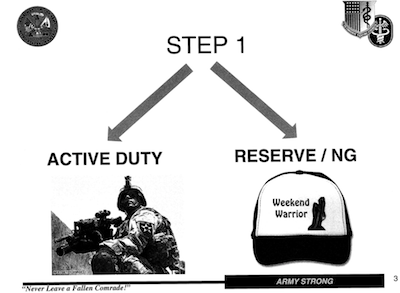Is the Army Shortchanging National Guardsmen on Healthcare?
A group of Oregon National Guardsmen returning from Iraq recently noticed that that the medical care the Army provided at Joint Base Lewis-McChord in Washington
Jul 31, 202069.4K Shares2.5M Views
A group of Oregon National Guardsmen returning from Iraq recently noticed that that the medical care the Army provided at Joint Base Lewis-McChord in Washington state differed significantly from what their active-duty comrades received. And they might have discovered a systemic problem in the process.
Some Guardsmen from the 41st Infantry Brigade Combat Team, while still called up on active duty, found themselves getting rushed through Lewis-McChord’s medical facilities. So they contacted their members of Congress to alert them to what they considered alarming anomalies between their treatment and that given to active-duty soldiers. Staffers for two Oregon legislators, Sen. Ron Wyden (D) and Rep. Kurt Schrader (D), visited Lewis-McChord on May 11. They quickly found that “this was more than a couple of isolated incidents,” said Wyden spokeswoman Jennifer Hoelzer.
Interviews with base staff and members of the 41st IBCT eventually led the congressional aides to discover a PowerPoint presentation at the base that clearly placed reservists and active-duty soldiers on two different tracks for medical attention. The PowerPoint, assembled by the family practice department at the base’s Madigan Army Medical Center, indicated that the goal for active-duty soldiers was to “RUSH” attention for an acute illness or infirmity to a unit medical provider. For reservists, the goal for most demobilizing soldiers was “GET HOME NOW.” For Guardmen and Guardswomen getting ready to deploy, it was “Get acute issues resolved and be eligible to deploy.” Feel confident about that standard of care?
The PowerPoint itself carried a flip — to the Oregon Guardsmen, offensive — illustration of the bifurcation. I’ll put the slide below:
In a letter to Wyden and Schrader, the chief of the Army’s Medical Command, Lt. Gen. Eric Schoomaker, “apologize[d]” for what he called the “insensitive and offensive depiction of Reserve Component Soldiers in this presentation.”
That’s not good enough for Wyden and Schrader. They’ve written to Army Secretary John McHugh asking for a full investigation of whether members of the 41st were treated as “second-class soldiers” and ensuring that the Guardsmen get “all the medical, pay and other benefits to which they are entitled.” Wyden spokeswoman Hoelzer expects McHugh in for a discussion about next steps later this week.

Dexter Cooke
Reviewer
Dexter Cooke is an economist, marketing strategist, and orthopedic surgeon with over 20 years of experience crafting compelling narratives that resonate worldwide.
He holds a Journalism degree from Columbia University, an Economics background from Yale University, and a medical degree with a postdoctoral fellowship in orthopedic medicine from the Medical University of South Carolina.
Dexter’s insights into media, economics, and marketing shine through his prolific contributions to respected publications and advisory roles for influential organizations.
As an orthopedic surgeon specializing in minimally invasive knee replacement surgery and laparoscopic procedures, Dexter prioritizes patient care above all.
Outside his professional pursuits, Dexter enjoys collecting vintage watches, studying ancient civilizations, learning about astronomy, and participating in charity runs.
Latest Articles
Popular Articles
